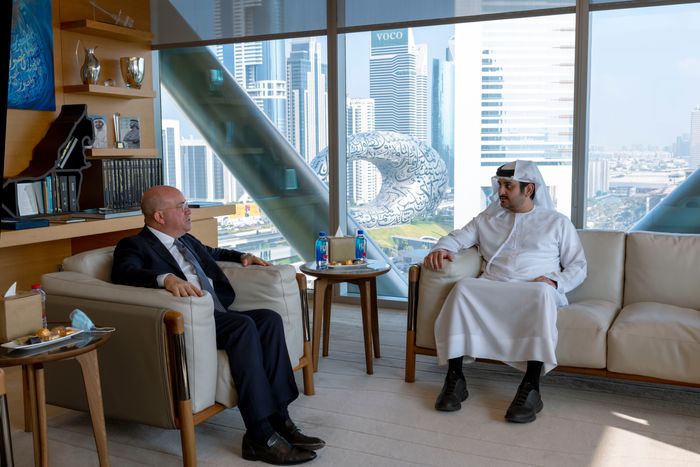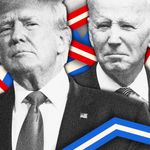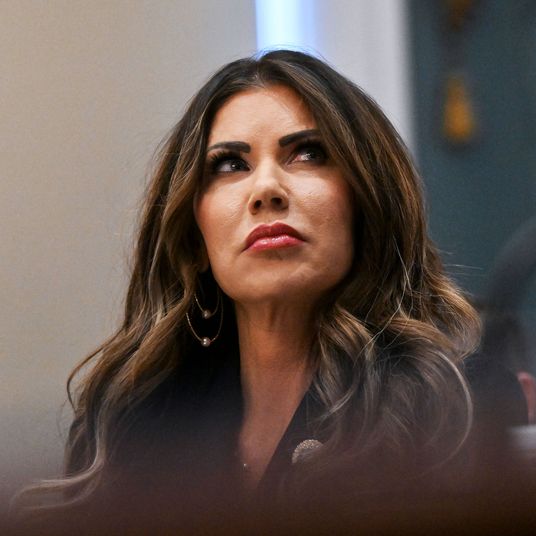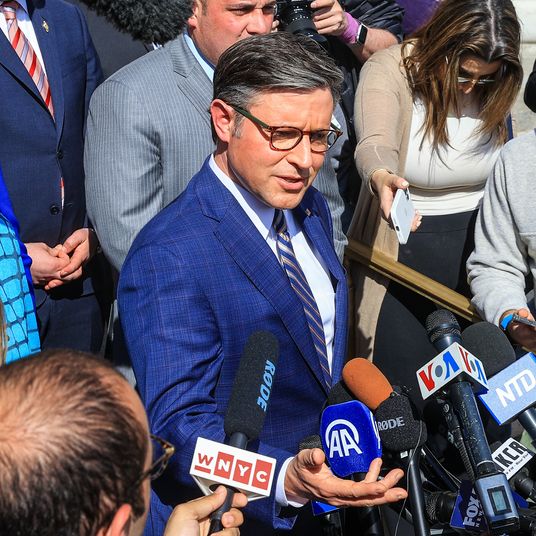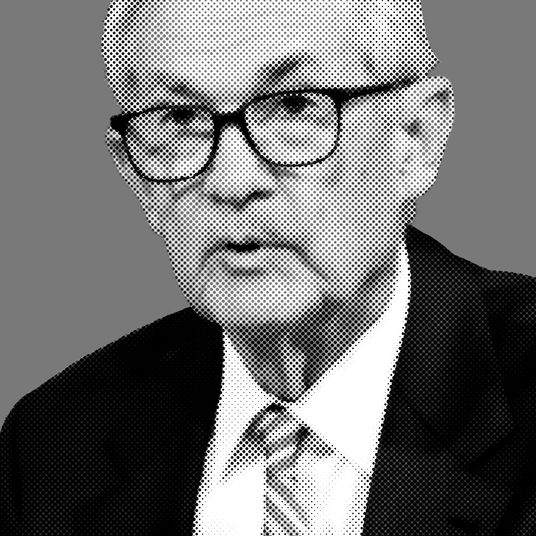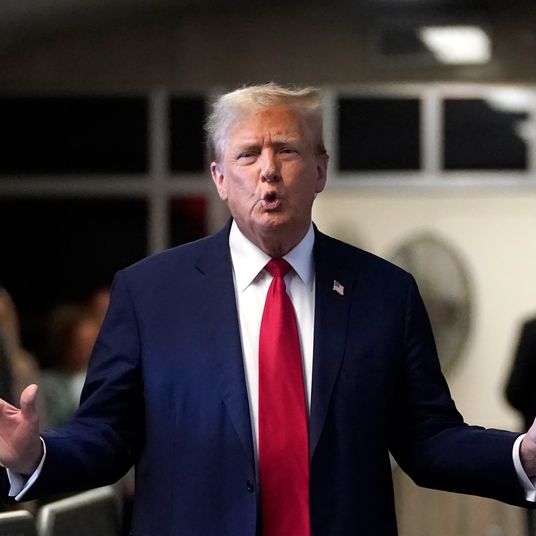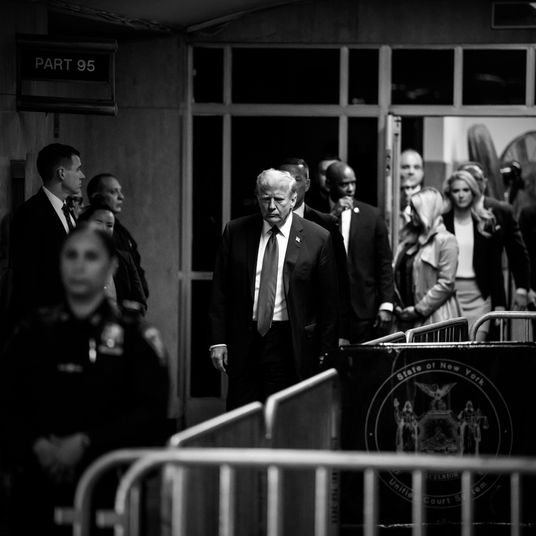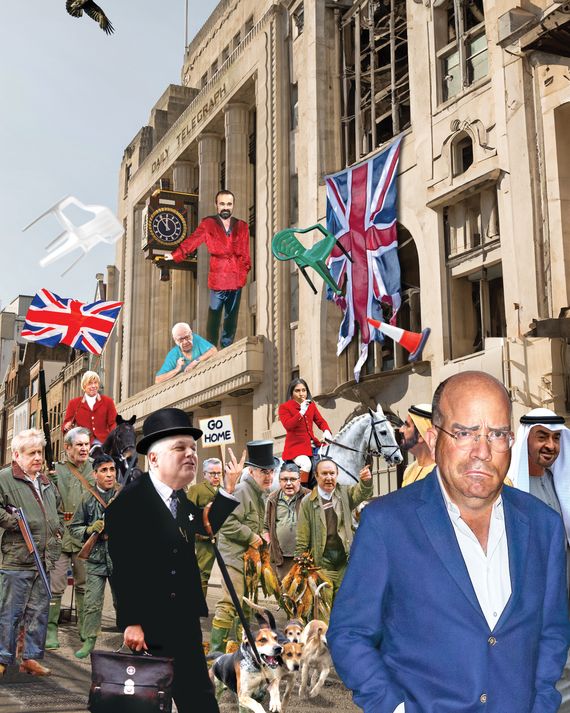
This article was featured in One Great Story, New York’s reading recommendation newsletter. Sign up here to get it nightly.
A classic 20th-century way for an outsider to achieve Establishment status has been to buy a British newspaper. From Canada, there were the outliers Max Aitken (who became Lord Beaverbrook), Conrad Black (who became Baron Black of Crossharbour — before disgrace, prison, and a presidential pardon), and the Thomson family (whose heirs became the first, second, and third Baron Thomson of Fleet); Robert Maxwell came via Czechoslovakia (and was elected a British MP — before mysterious death and disgrace); and, most dramatically, there was Rupert Murdoch from Australia. All became men of international clout and glamour by buying a piece of Fleet Street.
This was, however, in another world. Newspapers were flourishing, the U.K. was a portal to Europe and beyond, and British status was … status. Prompting the question of why Jeff Zucker, former president of CNN, former CEO of NBCUniversal, and, notoriously, one of the most grasping, tenacious, and successful players in U.S. media, would try to buy into a faded newspaper industry in a Brexit-diminished U.K., heading in the opposite direction of so many Brits in media who would do anything to work in the U.S. (a Brit, Mark Thompson, was given Zucker’s old job at CNN). It is worth noting that Zucker, in his 35-year career, in which he first achieved prominence as the 26-year-old executive producer of the Today show, had not shown much interest in print or, in fact, any evident interest in the U.K.
Still, with great confidence, on November 20, Zucker swooped in to buy two properties, the Daily Telegraph and the Spectator magazine. It was a bold political gesture as well as a swashbuckling media move. The Telegraph has long been, and meaningfully remains, the official voice of the Tories — the Conservative Party of Winston Churchill, Margaret Thatcher, and the U.K.’s past five prime ministers (though that run seems sure to end later this year). The Spectator is the 196-year-old journal of conservative opinion and sensibility — the world’s oldest continuously published general-interest magazine. Zucker wasn’t just trying to buy British media properties — he was, though he might not have been entirely aware of the breadth of his grab, trying to buy part of the country’s political system.
He also stepped into the middle of a bidding war for the titles, a contest that included Murdoch, the world’s most famous media mogul; Jonathan Harmsworth (a.k.a. Lord Rothermere), proprietor of the Daily Mail and the most successful U.K. newspaper publisher; Axel Springer, the largest German publisher and the owner of Politico; and Paul Marshall, a hedge-fund manager and U.K. conservative-media upstart, backed by Ken Griffin, one of the richest American hedge-funders. But with the competition heating up, Zucker, by an exceedingly clever bit of financial legerdemain, suddenly announced on that day in November he already bought both the Telegraph and the Spectator. By taking on the outstanding debt from the owners, which had been defaulted on, resulting in the sale, Zucker and his backers had put themselves at a huge advantage in the process. Technically, the properties were theirs — subject only to a possible review by British regulators.
The little world of Fleet Street was dumbfounded. And, likely, Zucker was a bit perplexed, too, with the response to his coup. A veteran cultivator of the press with, conversely, a notably thin skin, Zucker was immediately pummeled and vilified — not least by the publications he now effectively owned, waiting only to take formal control. Overnight, he seemed on his way to becoming a kind of business and social cautionary tale, a fatuous overreacher out of a Trollope novel.
At 58, Zucker had been famous for more than 30 years in U.S. media circles, and not just for his television skills — which included launching Donald Trump on The Apprentice — but for his ambition itself.
At Harvard, he was in that not-so-rarefied group of would-be first Jewish presidents — though he was at the top. “All the stuff people said about him at Harvard is still true,” a media banker told me recently, marveling at how little both Zucker’s various successes and various humblings had failed to lessen his hunger. Classmate Michael Hirschorn, who lost out to Zucker in a competition to edit the Harvard Crimson (Zucker’s last experience with a newspaper), memorably described him as “a living infomercial for what pure will to power will score you in the modern world.”
Two years ago, in February 2022, Zucker, in a surprise turnaround, was forced out as the president of CNN. The stated cause was an undisclosed relationship with a subordinate, Allison Gollust, his longtime PR lieutenant — but, in fact, that relationship had been widely known about for many years in the media industry. The true cause might more reasonably have been a last shot fired by AT&T executive Jason Kilar, whom Zucker theoretically reported to but whom he regularly snubbed, in the waning days of AT&T’s ownership of WarnerMedia, CNN’s parent. Or it might have been a favor to David Zaslav, the CEO of Discovery, the buyer of WarnerMedia, who, while theoretically a Zucker ally, might not have wanted Zucker — even his friend Zucker — breathing down his neck after the merger. At any rate, for Zucker, it was a painful fall.
He had once before, following his dismissal in 2011 as the head of NBCUniversal after Comcast had bought the company from General Electric, saved himself from media oblivion by pursuing and winning the CNN job (Trump still publicly insists he got the job for Zucker). But fired media CEOs tend to fade away. Long after his dismissal as the chief of HBO, and presumed heir to the C-suite at Time Warner, then the biggest power in media, Michael Fuchs said he waited for the phone to ring and was still waiting decades later.
The media wilderness, especially as the industry finds itself shrinking rather than expanding, with analogue talents of equivocal value in the digital world, is a pretty dismal place. An additional unkind cut for the most ambitious man in America, according to Zucker acquaintances: His former wife, the mother of his four children, was in a relationship with Carlyle Group co-founder David Rubenstein, a billionaire several times over.
Jobless, Zucker could be frequently spotted wandering the streets around his East 60s apartment, eating a sandwich at the single-counter coffee shop nearby on Madison Avenue, or at the Core club, a midtown redoubt for executives who have lost their office, or at Jack’s Stir Brew Coffee near his summerhouse in Amagansett.
Here you are in your professional prime in an industry, mass-market media, that more and more people have given up on. What do you do? The answer seemed to bring other media people to the edge of their seats. He was everybody’s omen. If Jeff Zucker couldn’t find a future … was there a future?
Well, everybody else may have lost faith in the media, but not the Persian Gulf sheikhs, who’d plunged billions in recent years into sports, movie financing and production, newspapers, television, music, and digital this and that.
On a wish list of media properties to buy for sheikhs with unlimited funds, CNN, with its international prestige and influence, might be at the very top. It was a big deal for Jeff Zucker, Mr. CNN, to arrive in town — Abu Dhabi, that is. This was an advantage for Zucker but a disadvantage too. Anyone backing him as an aspiring mogul would do it in part because of ambitions to own CNN, but CNN was not for sale. A reporter at Variety wrote that Zucker was looking for funds to buy CNN, and Zucker exploded in fierce denials. It was certainly the prize he wanted, just not one he could yet publicly reach for — but still the one anybody giving him money was counting on him to ultimately capture.
Among the more thriving sectors of the media business is the exchange of money for influence. Billionaires buy newspapers for their soft power, a voice when you need it, a presence at the table. It has always been thus, but it used to be that there was an expected financial upside too. There is much less so now, which changes the equation of what kind of billionaire is ready to be so free and less demanding with his dough.
The richest family in the world, with its members among the richest individuals in the world, is the Al Nahyan family. They are the absolute rulers of the United Arab Emirates, with much of their wealth and power in the hands of the six sons of UAE founder Sheikh Zayed bin Sultan Al Nahyan and his third wife, Fatima bint Mubarak Al Ketbi. Their personal fortunes are in the vicinity of $300 billion, but the distinction between family money and state money is far from clear, and the UAE’s sovereign-wealth funds amount to near $2 trillion. Among them, the Al Nahyan brothers control the most significant state functions and assets in the country: Sheikh Mohammed bin Zayed (MBZ), 63, is the UAE’s ruler; one of his brothers runs a national gas company; another national security; another foreign affairs. Sheikh Mansour, one of MBZ’s younger brothers, is deputy prime minister, chairman of the Central Bank, and head of two UAE sovereign-wealth funds. He also runs the family’s investment firm. As president of CNN, Zucker courted the UAE brass — CNN International is an important presence in the region — with Mansour a key contact and now Zucker’s primary backer in the bid to acquire the Telegraph and the Spectator.
In one view, the version Zucker hotly insists on, the Al Nahyans and their Saudi and Qatari counterparts, who have also made significant media investments, are simply international businessmen and world leaders — standard and responsible backers for an international corporate acquisition. In another view, there is Khashoggi, fossil fuels, Jared Kushner, and autocracy and corruption, which is why the media business doesn’t necessarily like to advertise where so much of its new money comes from.
Zucker, in his media exile, had been discussing the work he might do with the U.S. private-equity firm RedBird Capital Partners, which does media investing. But private equity is a business of constantly raising new money, sitting on boards, and engineering exit strategies, whereas Zucker wanted a media business to run. He did not want to back entrepreneurs. He wanted to be the entrepreneur. The solution was that RedBird would sign up to manage the deals that Zucker wanted, and the Al Nahyans, through their investment vehicle IMI, would put up a billion dollars to buy Zucker a kingdom — which might one day include CNN — creating the new entity RedBird IMI. For its billion, IMI would get 75 percent, and, for an unknown contribution, RedBird would share 25 percent with Zucker. Since December 2022, Zucker’s RedBird IMI has bought a handful of media companies, including one that produced The Morning Show for Apple TV+ (Zucker himself, curiously, being one of the central characters in the history of morning television), a documentary studio, a children’s-entertainment company, and a sports-news site; most recently, it has done a deal for All3Media, which produced the television shows Fleabag, Squid Game: The Challenge, and Penny Dreadful. RedBird IMI was also rumored to be a suitor for Graydon Carter’s newsletter, Air Mail — aptly suggesting the smallness of the opportunities out there.
The burdens of having to invest a billion dollars are significant. A billion dollars wants a billion dollars’ worth of something — if not strict return, then bragging rights, profile, bang for buck. And it doesn’t want to dribble out its funds. It wants a big deal. It wants … CNN. And if not CNN … well, the Daily Telegraph, which had suddenly come for sale.
The Telegraph? This must have sent Zucker running to Google. The Daily Telegraph may have great influence in the U.K., but its appeal, arguably its only appeal, is to a particular kind of Englishman, a self-consciously fogy sort, representing a kind of conservatism that conservatives in the U.S. would be sorely challenged to understand. Indeed, in its 169 years, it has only ever endorsed the Tory party. “Its stereotypical reader,” wrote Jane Martinson, a columnist at the Guardian, in her book about the Telegraph’s longtime owners the Barclay brothers, You May Never See Us Again, “was a former member of the armed forces who lived in the Shires and enjoyed hunting, shooting, and fishing.” The same kind of nostalgia that got Boris Johnson elected prime minister animates the Telegraph — “my real boss,” Johnson once said of the Telegraph, where he had been a columnist. Certainly an acquired taste, but several of the sheikhs went to school in the U.K. (the UAE was a protectorate of Britain until 1971 and its ruling family effectively installed by the Brits). Tory England — Brexit and recession be damned — retains its aspirational appeals. Owning the Telegraph was an ultimate sign of arrival.
For its part, the Spectator is arguably among the most independent, irascible, literate, and idiosyncratic voices in contemporary journalism and a particular expression of Tory sensibility (once edited by that other particular expression of Tory sensibility, Boris Johnson). It is so full of Toryspeak and famously opaque Tory humor that it would be difficult to imagine Zucker reading it, no less editing it. But for anyone with insider ambitions, the Spectator’s summer party is an unmissable event on the social and political calendar.
Zucker has shown no sign of doubtfulness about his billion-dollar patron’s desires. The media business is built on a certain sort of if-you-build-it-they-will come sophistry, and Zucker was quickly of the opinion that the Telegraph “brand” — brand being the key media word — had a worldwide value, even if that “brand” outside the U.K. was somewhat like Marmite: You really need to have grown up with it. And no matter that it was called the Telegraph! (Explain that to your children.) There was, to Zucker, a clear market in the U.S. for a right-of-center brand, even though Trump had effectively disappeared the right of center. Still, Zucker, not unreasonably, believed in his mass-media skills; possibly he was the last man with them. He could make the Telegraph work until something better — CNN — came along.
What he seems not to have counted on was walking into a crisis well beyond media skills, an existential one, of identity, meaning, freedom, and patriotism, expressed in quite an emotional outpouring in a country he hardly gave a whiff about. What big-brand media had lost in profits, it has replaced with furious territorial passions.
In 2004, the Barclay brothers, mysterious billionaire twins who finished each other’s sentences and who lived on a fortified Bond-villain private island and who had built a highly leveraged fortune in real estate, hotels, shipping, and anything else they could borrow money to acquire, bought the Telegraph and the Spectator from Conrad Black, who was fighting corruption charges, for £665 million, almost all of it borrowed from a bank later acquired by Lloyds Bank. The decline of the newspaper business and the demands of the debt caused a breakdown in the once-inseparable family and a default on their loan. In 2023, Lloyds seized the titles and put them up for sale in a bidding process that attracted most of the usual suspects in the U.K. news business.
Zucker, an American Jew and a liberal, and his Arab partners likely did not enter the formal auction because they understood they would be up against not only an inherent bias but the desire of the bank to do an easy transaction and avoid regulatory and public controversy.
But it was at that point that Nadhim Zahawi, an Iraqi-born Tory former MP and party chairman, operator at the highest levels of British politics, and, briefly, in the last days of Johnson, Chancellor of the Exchequer, got involved. Acting in the interests of Zucker and the Emiratis, Zahawi met with 89-year-old Frederick Barclay at the Dunhill haberdashery’s private cigar bar on Davies Street around the corner from Claridge’s. As it happened, the family had a short time left on their right to pay Lloyds in full on their debt and take back ownership of their property. Zahawi offered the Barclays a deal: Zucker’s RedBird IMI would loan the Barclays the money, £600 million, to repay their Lloyds debt, with a right to convert that loan into 100 percent of the equity of the Telegraph and the Spectator, and, as a further inducement, the Emiratis, independently, would loan the Barclays another £600 million against other assets that they were in danger of losing (primarily the Very Group, an online retail business). This, overnight, made Zucker a British press lord. To unlikely if not comic effect, Arabs and Jews, conspiring together, had seemed to steal the beating heart of Tory England.
There have been many unwelcome incursions into the British press, not least of all Rupert Murdoch’s predatory grabs, helping to establish him as the U.K.’s leading power broker. More recently, a Saudi investment group bought a minority interest in the Independent and the Evening Standard from the Lebedevs, the Russian-oligarch family that had already made the incursion. In fact, many believe that the Saudis through their financial stakes have achieved effective control over the papers, recently cutting staff and curtailing coverage.
But somehow Zucker and the Emiratis were a threshold beyond. The ostensible issue is foreign control — indeed, control by a foreign government over so important an outlet to the British governing party: a petrol state coming to tell us what to write. Fraser Nelson, who for 15 years has edited the Spectator, implied that he would resign if the Emiratis took over, dismissing Zucker as a mere figurehead for the Emiratis’ ambitions. Zucker insisted his partners were just passive investors and if they interfered, he too would resign. (Nelson reasonably asked, “And what then?”) The best defense of the Emiratis anyone seems to come up with was that they really, truly don’t interfere, except when it’s about their own family, which is to say among the most powerful entities in the Middle East.
Second only to the worry about UAE control was puzzlement about Zucker himself, what his experience in news and media — wherein everything served a ratings function — and his idea of a hybrid American Telegraph brand extension might produce. It seemed difficult, and perhaps ridiculous, to imagine the Telegraph and the Spectator in this new guise.
Almost immediately following the Zucker-Emirati deal with the Barclays, a group of vocal MPs lined up to oppose the incursion, followed then by the outlets of the other sour-grapes publishers who had hoped to buy the Telegraph and the Spectator, with a cheeky Rupert Murdoch leading the charge against foreign ownership (Murdoch had particularly wanted the Spectator). The government then stepped in with a ruling that required the paper’s new owners not to interfere with management of the Telegraph or the Spectator while the purchase was under review by Ofcom, the British media regulator. The effect of this was to have the publications, for which Zucker and the Arabs had so far spent £1.2 billion, bitterly attack them in an almost daily campaign of resistance and moral condemnation. Charles Moore, Thatcher’s biographer who has previously edited the Telegraph and who remains one of its leading columnists and, indeed, among the most quintessential Tory voices (the satirical magazine Private Eye calls him “Lord Snooty”), has regularly lambasted the deal, calling the Telegraph a “great British institution” that must not be “nationalised” by a foreign government. He has been joined in his condemnation — in print and in seemingly constant interviews — by Nelson and Andrew Neil, the Spectator chairman.
And where was Zucker? Even his supporters, albeit tepid supporters, wondered when the charm offensive would begin. Why wasn’t he here, in London, schmoozing, back-scratching, wining and dining and offering public comfort. “Probably because his American girlfriend is doing his PR,” snarled Neil, a redoubtable U.K. media presence and archfoe of the deal.
Zucker, better late than never, promised to put together a board to protect the Telegraph’s independence, a gambit long ago discredited by Murdoch’s disregard of the same such boards he had set up. And while Zucker was touting these protections of editorial independence, in early December, he had a “getting to know you” lunch in Manhattan at the Grill with Neil, who recalled Zucker making it clear that he saw himself as CEO and editor-in-chief of both the Telegraph and the Spectator, presumably from New York.
Zucker hired George Osborne, a former chancellor, now an investment banker, to help get the deal through the British government’s review — Ofcom would make its recommendation, and the culture secretary would render the decision.
According to Neil, “Osbo called me out of the blue on Christmas Eve. His exact words: ‘I’ve been brought in to help clinch this deal, and I’ve told Zucker that the best way to get his bid over the line is to make you editor-in-chief of the Telegraph and the Spectator. That way nobody will doubt their editorial independence.’ I did warn Osbo that I couldn’t see how it could be squared with Zuckie’s own ambitions to be the big enchilada.”
Neil continued, “Zuckie called on the morning of January 3rd. After a few pleasantries, he asked if I would become an editorial trustee of the Spectator as part of an initiative to ensure editorial independence. There was no mention of the Telegraph. I said that was such a diminution of my current role that it would be better if I just walked. I also said … I was prepared to discuss the possibility of a proper editor-in-chief role, but I knew that impinged on his own ambitions. We left it there. He said he’d be in touch again. He never was.”
Three weeks later, Neil went on the BBC’s leading news show to oppose the deal and state his belief that it would be the UAE royal family that would ultimately be calling the shots and setting policy at the Telegraph and the Spectator. Since then, Zucker’s effort at moneyman aloofness has broken down in an open display of hurt and exasperation toward Neil and a public quarrel about who said what to whom.
Another gambit to get the deal through regulators may have involved an offer to Johnson, who, many noted, was curiously silent about the takeover, to be the front man — but with Johnson still in political purgatory after being run out of Downing Street, this seemed hardly helpful to the proposition.
In a further cock-up in RedBird IMI’s hurried appeasement plan, it changed the structure of its acquiring company from a U.S. entity to a U.K. entity, causing British culture minister Lucy Frazer, who has ultimate authority over the deal, to declare that this seemed like flimflam and the review process that had been underway would have to begin from square one. Zucker began telling people he had learned a lot about British politics in a short period of time, which, of course, quite seemed to be the problem.
The Tory party has ruled Great Britain for the past 14 years, through Brexit, the fall of David Cameron (because of Brexit), the rise (because of Brexit) and subsequent fall of Boris Johnson, the brief days of Liz Truss, inflation, recession, and the downward slog of current prime minister Rishi Sunak. But that run seems to be near an end. Only a speculative miracle could prevent the return of a Labour government, now polling double-digit points ahead, in the country’s upcoming election, likely to occur in the fall. The Conservative Party, in a fight between far right and center, among Johnsonites, Cameronites, Brexiteers, not-so-Brexiteers, and anyone else who might plausibly be blamed for what has gone wrong, was, as it prepared for the wilderness, about to battle for its soul. Important parts of that battle would take place in the pages of the Telegraph and the Spectator. It was difficult to imagine the Tory party without the Telegraph and the Spectator. Likewise, it was difficult to imagine the Telegraph and the Spectator run by Zucker and the Emiratis. Indeed, how exactly would they run a paper with so many of its most prominent faces publicly vilifying them and declaring their willingness to walk out the door?
The bias here was both overt and subtle. The Barclays were terrible owners; you could hardly do worse than their financial mismanagement, their constant cutting of staff and resources, and their chronic interference. But they were Tories. Not just Tories — they were the Tory billionaires (when they still had billions) who paid for Thatcher’s Belgravia mansion and then, in her final months, put her up in the Ritz, their hotel. Somehow, the Barclays, Thatcher, and the Telegraph together transmuted into understanding the true Tory faith, and keeping it, in a fickle world.
Little of this resembles the way Zucker, or the mogul class, looks at media. As media becomes more of a constrained business — a troubled asset class — it becomes more of a technical one. You are managing decline. You’re fighting at the bottom rather than living at the top — but that can be a business opportunity as well as any other. Zucker is a good operator. Possibly a great one. In a world of limited media opportunities, he is able to discern the small successes. And, if you have to go low — and it is media, after all — he knows how low to go. He is shameless, certainly, and yet proud. And you could probably trust Jeff Zucker to keep his Emirati investors from exerting direct editorial influence — he would know how to do that; he would know what is required, which is perhaps what many people fear; he’d know how to bend over without needing to be told.
I doubt that there is any media enterprise that he doesn’t believe he couldn’t squeeze at least a little more out of — another ratings bump. In this, media is not the message; media skills are the message.
Ofcom delivered its report of the deal on March 11, finding it potentially “against the public interest.” Almost everyone anticipated that Frazer, the culture minister, now seems poised to order a more thorough second review. A further review might present Zucker with other problems, with the Emiratis then having to open their private communications, like their WhatsApp chats, for inspection, perhaps showing that their promise that this was exclusively a financial investment without regard for the influence they could wield was bollocks. Zucker was said to be searching for ways to bring the Emiratis’ stake under 50 percent — saving them that kind of scrutiny.
Days after the Ofcom report, an even more damning threat materialized — one that seems likely to scuttle the entire endeavor. The U.K. government announced its intention to introduce a bill aimed at blocking Zucker — it would “rule out newspaper and periodical news magazine mergers involving ownership, influence or control by foreign states.” It immediately gained the support of many members of both the Labour and Conservative parties. Zucker, in other words, had managed to unite the fractious extremes of British politics.
Prior to the government’s move, there were reports that an increasingly desperate Zucker was pursuing a plan to team up with Murdoch (who would take over management of the Spectator) and Harmsworth (who would take over management of the Telegraph), helping Zucker save face but not control, though RedBird and Harmsworth’s Daily Mail are hotly denying this. But now any position at all in the deal by a foreign government might run afoul of the prospective new rules (the exact details remain unclear). In early March, Zucker and RedBird were face-to-face with the reality that, to have any chance of completing the deal, they’d likely have to entirely replace the UAE’s cash — or forsake the acquisition. At the same time, walking away was also not quite an option because they had already given their money to the Barclays. And, indeed, there was suddenly a new scenario in which the Barclays, with the Zucker-UAE loan, could just resume management of the Telegraph and the Spectator, leaving RedBird IMI passively holding a debt that it might be difficult to recover.
Likely, the Zucker group will now have to sell the publications that it was never able to take over. But even here it is far from clear who actually has the right to sell them. The Barclays, who are yet the formal owners? The managers Lloyds Bank installed, who are yet running the companies? Or Zucker & Co., who could sell the debt they’ve incurred but in what might or might not be seen as a distressed market?
A broken deal and business smashup of the kind Zucker seemed to be facing is hardly a good look in an entrepreneur’s first foray with a billion dollars. But as Zucker tried to figure a way out of the hopeless corner he seemed to have put himself in, Zucker watchers were still not counting out his “will to power.” At a Hamptons gathering this past summer, not far from Zucker’s $16 million home, the Hollywood superagent Jay Sures delivered a stout defense of Zucker’s future prospects in the media business: “I would never, never, ever bet against Jeff. Never. Never!”
So, maybe, he might yet become Lord Zucker of Something-or-other.


